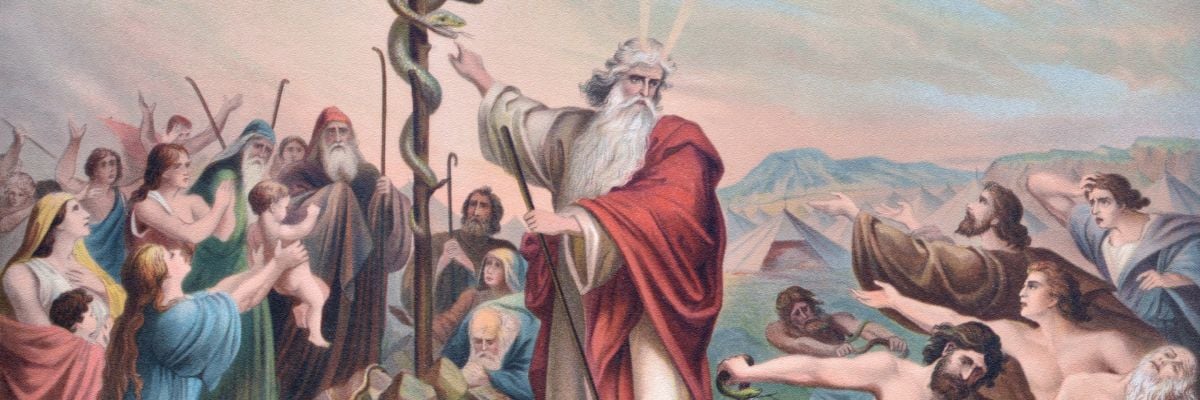
This book of Numbers is a narrative running from the second years after the Israelites leave Egypt up to almost the end of Moses‘ life-a total of about thirty-nine years’ wandering in the wilderness. It takes its name in the Hebrew Bible from bammidbar (= in the wilderness). The Greek translation of the Septuagint, however, prefers to call it “Numbers”, and the Latin follows suit. As a title this is less than satisfactory, because the counting of the people does not take up much of the book, which really is a history of the main events of the wanderings in the desert.
The book begins with God’s express command to Moses to make a census of the people, the effect of which will be to show that God indeed has kept his promise to Abraham: “I will indeed bless you, and I will multiply your descendants as the stars of heaven and as the sand which is on the seashore. And your descendants shall possess the gate of their enemies” (Gen. 22:17). The seventy-member family of Jacob which entered Egypt, now, some 450 years later, numbered around 600,000. Even if this statistic is not mathematically exact (that is not the purpose of the Bible) there is no doubt about the Jews being a very numerous people.
The book can be divided into three parts:
1. In Sinai. This part, which goes up to chapter 10, presents Israel as a holy people, in line with its vocation: its holiness comes from God, not from its own merits. It is divided into twelve tribes, according to Israel’s twelve sons, taken in groups of three. They all gather round the tent of meeting, with the Levites in the place of honour. The Israelites closeness to the tabernacle, with which they journeyed, meant that they had to have a high degree of legal purity; the regulations contained in chapters 5ff were aimed at ensuring this.
2. The journey through the wilderness. This is described in chapters 10-21. Moses maintains order while they are encamped in the Sinai. Then the entire people starts out again on its journey, conscious that they travel under the protection of Yahweh, who appears to them in the form of a cloud. They reach Cades, where they stop. Moses uses this respite to reconnoitre the land of Canaan and to promulgate a series of laws aimed at clarifying the basis of Moses’ and Aaron’s authority. Then, because of the opposition of the king of Edom they have to backtrack. Their entry into Canaan is delayed for thirty-eight years. If they had been docile to the Lord’s commandments, they would not have had to undergo all these privations. As it was, most of those who set out from Egypt did not live to enter Canaan.
3. On the plains of Moab. The third and last part of the book, up to chapter 36, describes events just prior to the entry into the promised land. Almost at its gates, Israel meets its last obstacle, Balac, King of Moab. Balac had tried to get Balaam, a seer, to put a curse on the chosen people, but providentially not only does Balaam not cooperate: he extols the privileges and promises God has given his people.
After this, when the Israelites cavort with the daughters of Moab and turn from Yahweh, a second census is held and towards the end of the book Moses establishes new laws to govern the life of Israel -laws more suited to a settled than a nomadic people, which will apply as soon as the Israelites take possession of Canaan.
The events narrated in Numbers do bring out into the open the infidelities and rebellious nature of the people of Israel. However, we would be mistaken if we thought that the lessons and punishments contained in the book applied only to these people. We are guilty of the same faults as they. We may be surprised at their hardness of heart, given all the miracles God worked for them, but the truth is that the same thing happens among Christians. If we carefully examine our own attitudes, we will be even more surprised: the Son of God dies for us to reconcile us to God and redeem us from sin and from the power of the devil; he gives us the great gift of divine sonship, and we respond not just ungratefully but with daily signs of infidelity, even to the point of insulting God’s majesty.
Israel’s pilgrimage through the wilderness has a deep religious meaning for Christians. We are “a chosen race, a royal priesthood, a holy nation, God’s own people, that you may declare the wonderful deeds of him who called you out of darkness into his marvellous light” (1 Pet. 2:9). God lives in our midst, in each of us personally, provided we stay faithful to his grace. But just as the people of Israel fall foul of temptation by dreaming about advantages of life in Egypt, so too Christians are easily deflected from the search for holiness and union with God by being attached to material possessions, ambition, sensuality or the easy life. The history of the chosen people as they make their way through the desert is often reflected in each Christian’s own story.


